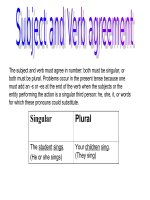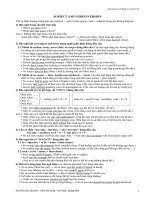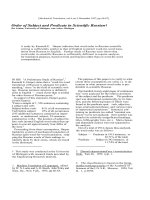Inversion of Subject and Verb
Bạn đang xem bản rút gọn của tài liệu. Xem và tải ngay bản đầy đủ của tài liệu tại đây (132.18 KB, 3 trang )
Agreement of Subject and Verb
SUBJECT AND VERB INVERSION
Trật tự bình thường trong một câu (subject + verb) bị đảo ngược (verb + subject) trong các trường hợp sau:
1) Đảo ngữ trong câu hỏi trực tiếp
Where are they now?
When did Tom leave school?
Lưu ý: Không đảo ngữ trong câu hỏi gián tiếp.
Anna asks Mary: "When did Tom leave school?" → Anna asks Mary when Tom left school.
→ Anna asked Mary when Tom had left school.
2) Đảo ngữ khi có trạng từ (adverbs) mang nghĩa phủ định đứng đầu câu
2.1 Nhóm từ seldom, rarely, never, little, no longer đứng đầu câu: Câu đảo ngữ dạng này thường dùng
với động từ ở thì hoàn thành (present/past perfect) hoặc với động từ tình thái (modals: can/could...)
Never have I seen such an untidy man. (Chưa bao giờ tôi thấy một người đàn ông lộm thộm thế.)
Never in her life had she experienced this exhilarating emotion.
(Chưa bao giờ trong đời nàng trải nghiệm cảm xúc vui vẻ này.)
Seldom has he seen anything stranger. (Hiếm khi nào anh ấy thấy cái gì lạ hơn thế.)
Rarely have I seen him looking so miserable. (Hiếm khi tôi thấy anh ta có vẻ quá khổ sở thế.)
Little does she realize how important this meeting is. (Cô ta không biết cuộc họp quan trọng đến thế.)
No longer does he love Mary. (Anh ấy không còn yêu Mary nữa.)
2.2 Nhóm từ no sooner ... than, hardly/scarcely/barely ... when: Câu đảo ngữ dạng này thường dùng để
diễn tả 2 hay nhiều hành động kế tiếp nhau trong quá khứ (past perfect + past simple)
No sooner had he gone out than it began to rain. (Anh ta vừa ra ngoài thì trời bắt đầu mưa.)
Scarcely had I got out of bed when the doorbell rang. (Tôi vừa ra khỏi giường thì chuông cửa reo.)
Barely had I started speaking when he interrupted me. (Tôi vừa mở miệng nói thì anh ấy cướp lời.)
3) Đảo ngữ khi có các kết hợp với "ONLY" đứng đầu câu.
Only after ........
Only when .......
Only if .........
Only then,
+ auliary verb + S + V Only by + noun/V-ing + auxilliary verb + S + V
Only then did I understand the problem. (Chỉ ngay sau lúc đó tôi mới hiểu vấn đề.)
Only by studying hard can you pass the exam. (Chỉ bằng cách học chăm chỉ bạn mới có thể thi đỗ.)
Lưu ý: Nếu câu có 2 mệnh đề thì đảo ngữ ở mệnh đề thứ hai.
Only when you grow up, can you understand it. (Chỉ khi nào em lớn lên em có thể hiểu vấn đề đó.)
Only if you tell me the truth, can I forgive you. (Nếu bạn nói ra sự thật, tôi có thể tha thứ cho bạn.)
Only after the film started, did I realise that I had seen it before.
(Chỉ khi phim bắt đầu chiếu tôi mới nhận ra mình đã xem rồi.)
4) Câu có chứa "not only... but also..." khi "not only" đứng đầu câu
Not only + auxiliary verb + S + V, but also + S + V
He not only studies well but also sings well. → Not only does he study well, but he also sings well.
5) Đảo ngữ khi có "SO/SUCH" đứng đầu câu.
5.1 so + adjective + to be + noun + (that-clause)
So strange was the situation that I coundn't sleep. (Tình huống quá kỳ lạ đến nổi tôi không ngủ được.)
So sudden was the attack that they had no time to escape. (Cuộc tấn công quá bất ngờ đến nổi họ .....)
5.2 such + to be + noun (+ that-clause)
Such is the stuff of dream. (Thật là một giấc mơ vô nghĩa.)
Such was his strength that he could bend iron bars.
(Anh ta có sức mạnh thật phi thường đến nổi anh có thể bẻ cong những thanh sắt.)
6) Một số trường hợp đảo ngữ khác (có chứa từ phủ định "no" đứng đầu câu)
At no time (chưa bao giờ) → At no time was the result of match in doubt.
In no way (không sao có thể) → In no way could I agree with you.
By no means (hoàn toàn không) → By no means did he intend to insult you.
In/Under no circumstances (dù trong bất kỳ hoàn cảnh nào cũng không)
→ Under no circumstances should you lend him the money.
On no account (dù bất cứ lí do gì cũng không) → On no account should the house be left unlocked.
NGUYEN DUC NHUAN – THCS Kim Dong – Nui Thanh, Quang Nam 1
Agreement of Subject and Verb
Negative statement + NOR + auxiliary verb + S + V (không ... cũng không)
→ He had no money, nor did he know anybody from whom he could borrow.
Only in this way (chỉ bằng cách này) → Only in this way can the problem be solved.
7) Đảo ngữ trong mệnh đề điều kiện (if-clause)
7.1 Đảo ngữ với should đứng đầu câu điều kiện loại 1 (ẩn IF)
If he calls, tell him I’ll ring back. ≈ If he should call, tell him I’ll ring back.
→ Should he call, tell him I’ll ring back.
If you are interested in our offer, please contact us.
→ Should you be interested in our offer, please contact us.
7.2 Đảo ngữ với were đứng đầu câu điều kiện loại 2 (ẩn IF)
If the guests arrived this week, there’d be no rooms available.
→ Were the guests to arrive this week, there’d be no rooms available.
7.3 Đảo ngữ với had đứng đầu câu điều kiện loại 3 (ẩn IF)
If the bombs had gone off, at least 600 people would have died.
→ Had the bombs gone off, at least 600 people would have died.
8) Đảo ngữ khi đầu câu có từ "here/there", từ chỉ nơi chốn đi kèm các động từ như: lie, live, sit, stand,
come, go... hoặc các tiểu từ của động từ kép (come down, go up...).
Trường hợp này chỉ đảo động từ chính ra trước chủ ngữ; không được mượn trợ động từ (auxiliary verb)
In that cottage lives an old man. (Một ông lão sống trong ngôi nhà nhỏ ấy.)
In the corner of the room stands a wardrobe. (Ở góc phòng có một tủ đựng quần áo.)
In the middle of the room is a table. (= There is a long table in the middle of the room.)
Here comes a taxi! There goes the last train!
Here’s your letters.
Lưu ý: Trong trường hợp này, nếu chủ ngữ là một đại từ (pronoun): we, he, she, it, they... thì không đảo ngữ
Here you are. There it is. (Không nói: Here are you. There is it.)
EXERCISE 18.1: Rewrite each sentence, beginning as shown, so that the meaning stays the same.
1. I've never seen such a mess in my life.
Never ......................................................................
2. They had seldom participated in such a fascinating ceremony.
Seldom ......................................................................................................................................
3. The embassy staff little realized that Ted was a secret agent.
Little ..........................................................................................................................................
4. The shop can in no way be held responsible for customers' lost property.
In no way ...................................................................................................................................
5. The couple had no sooner arrived than the priest started the ceremony.
No sooner ..................................................................................................................................
6. The restaurant cannot accept animals under any circumstances.
Under .........................................................................................................................................
7. Her grief was so great that she almost fainted.
So ...............................................................................................................................................
8. She had hardly begun to speak when people started interrupting her.
Hardly ........................................................................................................................................
9. I only realized what I had missed when they told me about it later.
Only when ..................................................................................................................................
10. You won't find a more dedicated worker anywhere than Mrs. Green.
Nowhere ....................................................................................................................................
11. He forgot about the gun until he got home.
Not until ....................................................................................................................................
12. The only way you can become a good athlete is by training hard every day.
Only by .....................................................................................................................................
NGUYEN DUC NHUAN – THCS Kim Dong – Nui Thanh, Quang Nam 2
Agreement of Subject and Verb
13. I realized who he was only when he removed his dark glasses.
Only ..........................................................................................................................................
14. She didn't realize that she had lost her purse until she got home.
Not until ...................................................................................................................................
15. He never suspected that the money had been stolen.
At no time ................................................................................................................................
16. We only dispatch goods after receiving the money.
Only after the money ...............................................................................................................
17. The only way to eliminate world terrorism is by united opposition.
Only by ....................................................................................................................................
18. The two sides never looked likely to reach an agreement.
At no time .................................................................................................................................
EXERCISE 18.2: Choose the correct word or phrase to complete each sentence.
1. Seldom ...................... a newspaper.
A. buys Anna B. does Anna buy C. bought Anna D. Anna does buy
2. No sooner ................. the house than the phone started to ring.
A. did he enter B. he had entered C. entered he D. had he entered
3. At no time .................. greater opportunities.
A. did women had B. have women had C. does women have D. has women dad
4. On no account ................. any money if he offers you.
A. must you accept B. did you accept C. do you accept D. you accept
5. Not a single word ................ during dinner.
A. did he say B. was he said C. said he D. were he said
NGUYEN DUC NHUAN – THCS Kim Dong – Nui Thanh, Quang Nam 3









